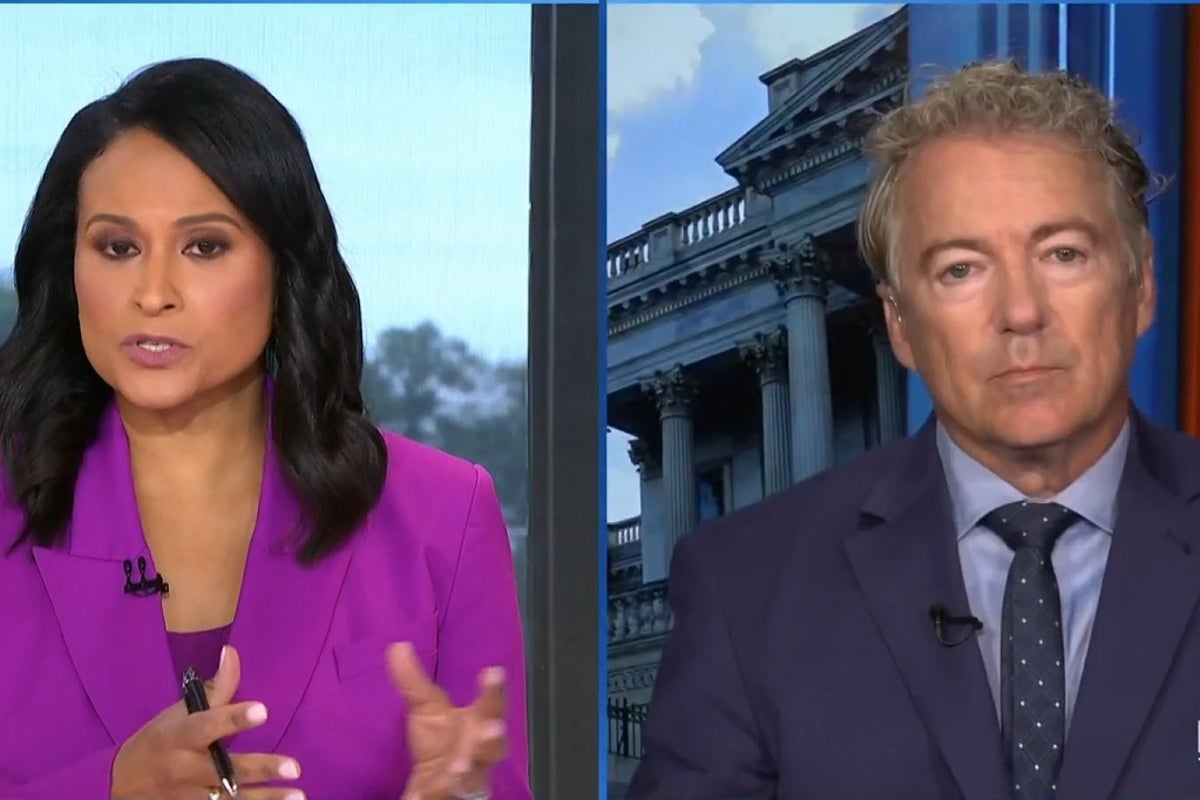Republicans on Capitol Hill are not entirely comfortable with Donald Trump’s efforts to suppress dissenting views on the mainstream broadcast and cable channels, and a divide is emerging in the party over the efforts by the administration to pressure ABC into suspending Jimmy Kimmel indefinitely last week.
On Sunday, two recurring critics of the president within his own party were on the Sunday talk circuit reacting to Kimmel’s suspension. The Jimmy Kimmel Live! host was pulled from the airwaves last week after making comments about the shooting death of Charlie Kirk on his show and accusing Republicans of exploiting the moment for recriminations against the left.
Sen. Rand Paul told NBC’s Meet the Press that companies like ABC had the right to make content choices based on the reactions of their audiences, but stressed that the Trump administration went too far with the direct involvement of the Federal Communications Commission (FCC) and its chair, Brendan Carr. The Trump-appointed chair publicly threatened Kimmel and ABC in the hours before the host’s suspension.
“The government’s got no business in it, and the FCC was wrong to weigh in,” Paul said on Sunday. “Brendan Carr’s got no business weighing in on this.”
He continued, pivoting to defend ABC’s decision to suspend Kimmel: “This is television for goodness’ sake. You have to sell sponsorships. You have to sell commercials, and if you’re losing money, you can be fired.”
Rep. Don Bacon, a conservative in the House who frequently clashes with the president on Ukraine, blasted Trump on CNN Sunday for what he said was a lack of leadership and “unifying” statements coming from the White House.
“The president, doing threats against the media is … wrong,” Bacon said on Sunday. “To threaten media, and say you’re gonna pull their license – that’s not what America is about.”
Bacon would go on to encourage all Americans to tone down political rhetoric and end the “blame game” in response to shootings and acts of violence. He stressed that members of both parties were victims of the phenomenon, and encouraged a thoughtful approach to identifying the causes and motivations behind the murder of Kirk and other acts of political violence, like the attack on Paul Pelosi.
He was asked by CNN’s Manu Raju whether the White House was further dividing the country by heaping blame on the left for Kirk’s shooting and denying that political violence was an issue on the far right. The president and members of his inner circle, particularly including his sons Eric and Donald Jr., have actively pushed that narrative in the wake of Kirk’s shooting while evading questions and reflection on their own past actions — including instances where Republicans including Donald Trump Jr., joked openly about Pelosi, who is the husband of former Speaker Nancy Pelosi, being brutally attacked and injured severely in his own home.
Bacon responded that the president’s assertion that only Americans on the political left were guilty of committing political violence was factually inaccurate, and divisive.
“That’s not a very unifiying – I don’t think it’s accurate, for one, and it’s not unifiying,” Bacon told CNN.
“He had the opportunity to say, to acknowledge that couple, Democrats, were murdered in Minneapolis,” the congressman continued, referring to the shooting of Minnesota House Speaker Melissa Hortmann and her husband earlier this year by a man Trump Jr. and other allies of the president have falsely said was committed by a left-wing shooter.
The shooter in Minnesota “called himself pro-life”, Bacon said on Sunday. Indirectly acknowledging that misinformation campaign embraced by Trumpworld, he added that the shooter in reality “surely was more on the conservative side, it seems”.
But other conservatives in Congress are willing to sign on to Trump’s efforts to roll back First Amendment protections, with some openly admitting to that intention.
“Under normal times, in normal circumstances, I tend to think that the First Amendment should always be sort of the ultimate right. And that there should be almost no checks and balances on it. I don’t feel that way anymore,” Sen. Cynthia Lummis, a Republican from Wyoming, told Semafor this past week.
“I feel like something’s changed culturally. And I think that there needs to be some cognizance that things have changed,” Lummis continued.
On Sunday, Sen. Markwayne Mullin of Oklahoma also came to the president’s defense. Rather that defend an expansion of the boundaries of free speech, the senator seemed to imply that Kimmel and others were inciting violence with criticism of the president likening him to an authoritarian dictator or leaders of Nazi Germany.
“Absolutely, I believe in free speech. Without question, I believe in free speech. [But] there’s a thin line between free speech and when it crosses a line and causes violence,” he said.
“When you start using words, that he’s a “Nazi”, comparing him to [Adolf] Hitler…these are the negative stories that have been played about [Trump],” Mullin continued. “There is a problem at some point and some people have to be held accountable.”
Kimmel’s suspension was widely condemned by entertainment figures including his fellow late-night hosts: Seth Meyers, Conan O’Brien and Stephen Colbert. Jimmy Fallon, host of the Tonight Show, offered milder condolences. Other stars like Pedro Pascal also weighed in on the apparent censoring of Kimmel at the government’s behest.
Trump, on Truth Social, openly gloated about Kimmel’s suspension and seemed to vow further pressure against NBC to ensure that Meyers and Fallon would be next.
CBS, citing financial realities, cancelled the long-running Late Show with host Stephen Colbert, another outspoken critic of the president, earlier this year.

